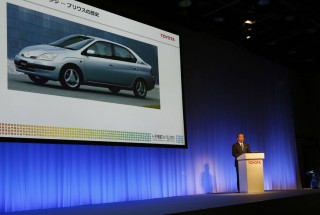Loading
Search
▼ Toyota Aims to Phase Out Gasoline by 2050
- Category:Other

JAPAN NEWS
The Associated Press TOKYO (AP) — Toyota, under ambitious environmental targets, is aiming to sell hardly any regular gasoline vehicles by 2050, only hybrids and fuel cells, to radically reduce emissions.
The automaker promised to involve governments, affiliated companies and other “stakeholders” in its push to reduce average emissions from Toyota cars by 90 percent by about 2050, compared with 2010 levels.
Electric cars weren’t part of their vision, outlined by top Toyota Motor Corp. officials at a Tokyo museum on Wednesday, striking a contrast with rivals such as Nissan Motor Co., which has banked on that zero-emissions technology.
Toyota’s commitments come at a time when the auto industry has been shaken by a scandal at Germany’s Volkswagen AG, in which it admitted it cheated on diesel emissions tests covering millions of cars.
Toyota projected its annual sales of fuel cell vehicles will reach more than 30,000 by about 2020, which is 10 times its projected figure for 2017.
Fuel cells run on hydrogen and are zero-emissions. Toyota’s Mirai fuel cell car went on sale late last year. Toyota has received 1,500 orders for the Mirai in Japan, and it just went on sale in the U.S. and Europe.
Annual sales of hybrid vehicles will reach 1.5 million by 2020 and Toyota would have sold 15 million hybrids, nearly twice what it has sold so far around the world, it said.
Hybrids switch back and forth between a gasoline engine and an electric motor to deliver an efficient ride.
The Toyota Prius, which went on sale in 1997, is the top-selling hybrid, with about 4 million sold globally so far. Toyota is promising to develop a hybrid version in every category, including usually gas-guzzling sport-utility vehicles, as well as luxury models.
“You may think 35 years is a long time,” Senior Managing Officer Kiyotaka Ise told reporters. “But for an automaker to envision all combustion engines as gone is pretty extraordinary.” Ise acknowledged some gasoline engine cars would remain in less developed markets, but only in small numbers.
He and other Toyota officials insisted on the inevitability of their overall vision, stressing that the problems of global warming and environmental destruction made a move toward a hydrogen-based society a necessity.
Experts agree more has to be done to curtail global warming and pollution, and nations are increasingly tightening emissions standards.
But they are divided on whether all gasoline engines will disappear, or they’ll stay on, thanks to greener internal combustion engines, as well as the arrival of clean diesel technology.
Tatsuo Yoshida, senior analyst at Barclays Securities Japan in Tokyo, said Toyota’s goals weren’t far-fetched.
- October 19, 2015
- Comment (0)
- Trackback(0)

